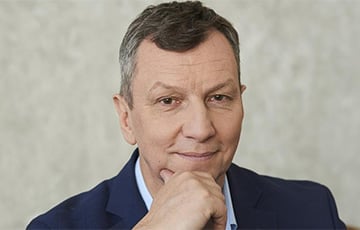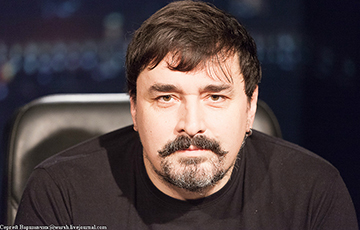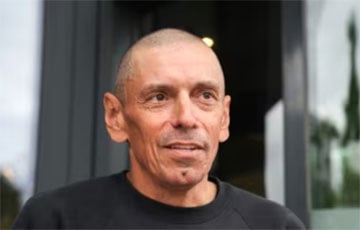Andrzej Halicki: Lukashenka Should Be Handed Over To The Hague
26- 23.07.2025, 16:38
- 12,466

The EU will no longer fall for the Belarusian dictator’s tricks.
Lukashenka is fully controlled by Putin and is a war criminal who must be brought to justice. Polish MEP and Vice-Chair of the European People's Party Andrzej Halicki expressed his opinion in an interview with the website Charter97.org.
— Lukashenka likes to speak about his power in Belarus, but his dependence on Putin is growing with time. As of today, can Lukashenka be called even a dictator, who rules Belarus?
— Lukashenka is a dictator, even if under the protection of another dictator. Lukashenka’s future is the International Criminal Court. He is not only a dictator, but a war criminal too.This should be stated very clearly and at every opportunity. He is not the legitimate president of Belarus anymore, because he has stolen this function in 2020. We know perfectly well that the Belarusians chose another leader and another direction for their country. They wanted change but the corrupted regime of Lukashenka rigged the elections and stole their decision.
— And what about the Lukashenka-Putin relationship?
— Lukashenka does not exist without Putin. It was Putin who decided that Lukashenka should remain a president in Minsk. Lukashenka is subordinate to Moscow because he knows that Putin can withdraw his protection from him, as was the case for Vlad Plahotniuc in Moldova or Yanukovych in Ukraine Both of them kept their personal security but lost power in their country. That was, in my opinion the fear of Lukashenka in 2020, he was scared that the protests would gain the range and scale big enough to convince Putin that Lukashenka is not capable anymore to keep the order and Moscow subordination in Belarusian political system.
— Can we say that Lukashenka sometimes plays his own game?
— No, everything or almost everything is coordinated. He is too weak to be independent. A long time ago, at the beginning of this century, he tried to play such a game, mainly based on economic issues (it was illusory, it was untrue). I think that if there were such naive people on the European side, who thought that Lukashenka could be talked to as a partner — well, today there can be no illusions about it.
— How should the EU react, if there were attempts from Lukashenka to return to past normal relations?
— I think that today, realistically there is no partner in the EU, who will fall for it. Lukashenka should be handed over to The Hague and severely punished. Not only because he imposed a bloody regime in Belarus and tortured hundreds of people, imprisoned 1,500 and more political prisoners; and imposed discrimination on an extraordinary scale, including the families and friends of the prisoners . After all, he is also responsible for despicable crimes of kidnapping Ukrainian children and their Russification.
— A joint Russian-Belarusian military exercise ‘Zapad 2025’ is scheduled to take place this autumn. The last such exercise ‘Zapad 2021’ became a preparation for the full-scale aggression in Ukraine. Should Poland be ready for contingencies?
— These are traditional and well-known military exercises, which are to be close to the border in order to scare us. Obviously, we have to be prepared for any eventuality, including provocations. At the same time, we have to be ready to respond adequately to a potential threat with exercises on our side.
I would personally give a closer attention to those CSTO exercises that engages not only military but also civilian and police forces of the power structures, i.e. “Brotherhood” exercises. Interesting and important are in my opinion exercises “Barrier”, that try to exercise the biological and chemical tools of force.
— Theoretical question, if Putin tries to create a land bridge between Kaliningrad and Belarus through Lithuanian territory, should Poland intervene and help Lithuania to defend itself?
— We have to take all scenarios into account. Any action of Poland in the Baltics will be closely coordinated with our partners in the Baltics, our friends from the EU and NATO. Lithuania is indeed dealing with a potential threat from the Russian army. We have the same in the case of Suwalki Gap, which has been considered as an area of provocation for years. In the Baltics there is an issue related to the Russian minority in those countries that might be exploited by the Kremlin
We don't know whether the priority scenario for Putin is an attack on Poland or on the Baltics , but I wanted to say very strongly that any violation of the borders of countries that belong to the North Atlantic Alliance must absolutely meet with the activation of all possible forces under NATO Article 5, including the Polish army and Polish combat capabilities, in order to deter or push the aggressor away. We must be sure that we will jointly, in solidarity, defend every inch of land of our countries. This response must not only be obvious, but also confirmed by the decisions at the international level: European and NATO structures.
— If Russia attacked Lithuania, should Polish soldiers support its neighbors?
— As well as soldiers of other countries of the North Atlantic Alliance they should be obliged by Article 5 to react. I have no doubts about that. Each step on this way will be coordinated with the Lithuanian authorities or the authorities of any other country under attack.
— Economically speaking, Putin is losing people and money — how long can Russia sustain its war of aggression against Ukraine?
— Well, a million people of Russian losses is not a tiny amount. Sadly for the Russians, Putin does not take into account lives or health of the Russian citizens.
According to sociologists, the political mentality of Russian society, such obedience, discipline, and even, in a sense, the expectation of a strong ruler — this is completely alien in democratic societies but exists in the Russian society. I am not saying that this is an expectation of tyranny by the Russians, but still a nostalgia for a strong ruler exists. Regardless of this, Putin takes into account the economic situation to a small extent, because even with this mentality, which is difficult for Western societies to accept, there is still a certain level, the minimum, below which is a rebellion.
I don't see such power and organized rebellion in Russian society at the moment, but I think that the long-term war and the expenditures that are being carried out today, i.e. the financing that Russia has to implement in order to continue the war, are already so large that it really costs society too much - this is visible. Propaganda still dominates, but recent EU sanctions against the energy sector - this is one of the elements of the pressure, quite consistent, although slowly.
From my point of view, I am irritated that sanctions are being introduced so slowly, while some countries and companies are engaged in unethical business and find loopholes. We have to be much more efficient. Energy resources and, I think, fertilizers have also become an important element of military funding, because these are billions of euros per year, so a very high level of funding for the Russian army, first of all, and not for the civilian economy. The recent decisions on EU sanctions against Russia, i.e. the packages concerning the energy sector is a big blow to the Russian economy. How long will the Russian economy withstand? It's hard for me to say. We have to do everything so that the Ukrainian army and society withstand this pressure and this attack and we have to be in solidarity with Ukraine.
— Could you share a life-advice with our readers? How does one survive in a country with a dictatorial regime that brutally suppresses any thought about dissent?
— You always have to care about faith and hope. When I was young in the times of the Polish communist era, I definitely had those. I was rebellious, I wanted freedom and opposed the communist government. I was active in a student organization. In a radical group of people we did all sorts of things, from publishing to activities on the streets, but also we did Radio Solidarity. We were very well organized after some time, but I don't know if we were convinced that we would achieve our goal in the foreseeable future. We knew that we couldn't be part of them, we couldn't give up. This was our inner conviction. Even at a high price: problems with studies, work.
I think that you are in a much more difficult situation than we were. I admire all those who in these conditions decide to show their identity, disagreement with what is happening in Belarus. Not only politically, but also in matters of faith. There is actual delegalization of some churches. I must say that this did not happen even in communist Poland. In the end, these churches were also an element of freedom and identity.
But we were in this most difficult, most gloomy situation, when we had martial law and actually such a conviction that it would be very difficult to change it. And you have this situation, in which thousands of people were sent to the harshest camps with long sentences and did not break down. Siarhei Tsikhanouski, who is set free after a few years, and Svetlana, who greets him, is a symbol like Wałęsa was, for whom his wife received the Nobel Prize, because he was still in Poland under the martial law.
I think that the image of the Tsikhanousky family contributes to the personal hope of many Belarusians. It proves there is no such difficulty that does not end at some point with the victory of good over evil. One Polish priest who was fighting communism, Jerzy Popiełuszko once said: "Overcome evil with goodness". It is very difficult, but possible It is actually incomprehensible in the situation of this drama, this torture, this restriction not only of freedom, but also of the possibility of normal life, of any normal functioning, but it seems to me that it is such a maxim that good prevails over evil builds the conviction that despite all, this fight sis worth it.











